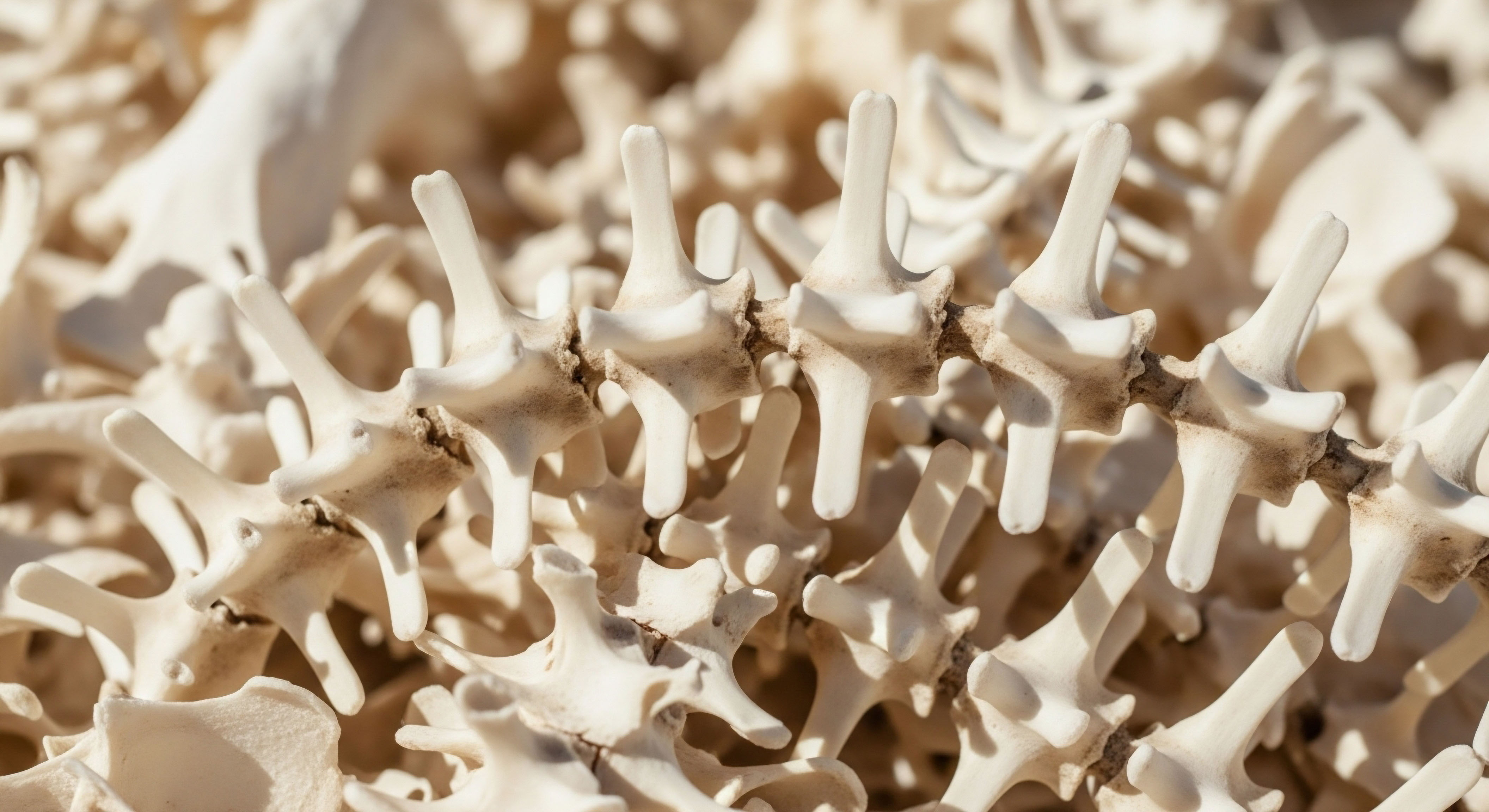

Fundamentals
Many individuals experience a subtle, yet persistent, shift in their overall vitality. Perhaps a gradual decline in energy levels has become noticeable, or a sense of mental clarity feels less sharp than it once did. For some, changes in body composition, despite consistent efforts, can feel particularly frustrating.
These experiences, often dismissed as simply “getting older,” frequently point to deeper biological recalibrations within the body’s intricate messaging systems. Understanding these internal shifts, particularly within the endocrine system, offers a pathway to reclaiming a sense of balance and function.
When considering protocols like Testosterone Replacement Therapy (TRT), the focus often rests on the direct administration of hormones. Yet, the body operates as a unified network, where every system influences another. The endocrine system, a collection of glands producing hormones, acts as the body’s internal communication network, orchestrating processes from metabolism to mood. What we consume, the very fuel we provide, directly impacts the efficiency and harmony of this complex system.
The body’s internal messaging systems, particularly the endocrine network, are profoundly influenced by daily dietary choices.

The Endocrine System and Dietary Influence
Hormones serve as chemical messengers, guiding cellular activities throughout the body. These messengers regulate growth, development, metabolic processes, and even reproductive functions. Nutritional intake provides the essential building blocks and cofactors necessary for hormone synthesis and release. Macronutrients, such as proteins and fats, contribute structural components for hormone creation, while vitamins and minerals act as catalysts in biochemical reactions within endocrine glands.
A well-balanced dietary pattern supports the overall function of the endocrine system. Conversely, imbalances in nutrient intake can disrupt hormonal equilibrium, leading to various physiological challenges. For instance, diets rich in refined sugars and processed foods can strain the pancreas, impacting insulin regulation and potentially contributing to insulin resistance. This metabolic dysregulation can then cascade, affecting other hormonal pathways.

Why Dietary Considerations Matter on TRT
Testosterone Replacement Therapy aims to restore circulating testosterone levels to a physiological range, alleviating symptoms associated with deficiency. While TRT directly addresses hormonal levels, its effectiveness is significantly enhanced when complemented by a supportive lifestyle, with nutrition standing as a primary component. The body’s response to exogenous testosterone, its ability to metabolize it efficiently, and the management of potential side effects are all influenced by dietary choices.
Consider the liver, a central organ in hormone metabolism and detoxification. A diet that burdens the liver with excessive processed foods or alcohol can compromise its capacity to process hormones effectively, potentially altering the desired outcomes of TRT. Similarly, the cardiovascular system, which can be influenced by testosterone levels, benefits immensely from a heart-healthy dietary approach.
Understanding the foundational principles of how diet interacts with the endocrine system, particularly during TRT, empowers individuals to actively participate in their wellness journey. It moves beyond passive treatment to an active partnership with one’s own biology.


Intermediate
Embarking on Testosterone Replacement Therapy (TRT) represents a significant step toward hormonal recalibration. While the administration of testosterone is a direct intervention, the body’s response is a symphony of interconnected biological processes. Dietary considerations during TRT extend beyond simple caloric intake; they involve strategic nutritional choices that support the therapy’s goals, mitigate potential side effects, and optimize overall physiological function.

Macronutrient Balance for Hormonal Optimization
The foundational elements of any dietary strategy involve macronutrients ∞ proteins, fats, and carbohydrates. Each plays a distinct, yet interconnected, role in supporting hormonal health and metabolic efficiency during TRT.

Protein Intake and Muscle Support
Adequate protein consumption is paramount for individuals undergoing TRT. Testosterone promotes muscle protein synthesis, and providing sufficient amino acids ensures the body has the building blocks to capitalize on this anabolic effect. Aiming for approximately 1.2 to 2.2 grams of protein per kilogram of body weight daily, distributed across meals, can optimize muscle growth and support hormonal balance.
- Lean Meats ∞ Chicken, turkey, and grass-fed beef provide high-quality protein.
- Fatty Fish ∞ Salmon, mackerel, and trout offer protein alongside beneficial omega-3 fatty acids.
- Eggs ∞ A versatile source of amino acids and micronutrients vital for hormone production.
- Plant-Based Options ∞ Legumes, tofu, and tempeh contribute substantial protein and fiber.

Healthy Fats and Hormone Synthesis
Dietary fats are not merely energy sources; they are indispensable for hormone production, including testosterone itself. Cholesterol, derived from dietary fats, serves as a precursor for steroid hormones. Prioritizing healthy fats supports heart health and hormonal equilibrium.
Incorporate sources rich in monounsaturated and polyunsaturated fats. These include avocados, nuts such as almonds and walnuts, and seeds like flaxseeds and chia seeds. Olive oil is another excellent choice. Conversely, limiting unhealthy trans fats and excessive saturated fats is advisable to support cardiovascular well-being, a consideration often linked with hormonal health.

Carbohydrates and Metabolic Stability
The quality of carbohydrates consumed significantly impacts blood sugar regulation and insulin sensitivity, which are intertwined with hormonal balance. Opt for complex carbohydrates found in whole grains, vegetables, and fruits. These sources provide sustained energy release and dietary fiber, supporting digestive health. Limiting refined sugars and highly processed foods is essential, as they can lead to insulin spikes and inflammation, potentially counteracting the benefits of TRT.
Strategic macronutrient intake, particularly protein and healthy fats, directly supports the body’s hormonal and metabolic adaptations during TRT.

Micronutrient Support and Antioxidant Defense
Beyond macronutrients, specific vitamins and minerals play a critical role in testosterone synthesis, metabolism, and overall cellular protection.

Key Vitamins and Minerals
Several micronutrients are particularly noteworthy for their influence on hormonal pathways:
- Zinc ∞ This mineral is a catalyst in testosterone production and is vital for male reproductive system function. Oysters, lean meats, and pumpkin seeds are excellent sources.
- Vitamin D ∞ Often referred to as a pro-hormone, vitamin D is directly linked to testosterone synthesis and overall hormonal health. Fatty fish, fortified foods, and sunlight exposure contribute to adequate levels.
- Magnesium ∞ Found in leafy green vegetables, nuts, and seeds, magnesium may influence testosterone levels and supports various metabolic processes.
- Vitamin C ∞ An antioxidant that supports immune function and hormone metabolism. Citrus fruits, berries, and broccoli are rich sources.
- Vitamin E ∞ This antioxidant protects testosterone molecules from oxidative damage, helping to maintain the benefits of TRT. Almonds, sunflower seeds, and olive oil provide vitamin E.

Antioxidants and Cellular Protection
TRT can increase metabolic activity, which may lead to increased oxidative stress. Antioxidants act as cellular guardians, neutralizing harmful free radicals and protecting cells and hormones from damage. Incorporating a diverse array of antioxidant-rich foods is a proactive strategy. Berries, dark leafy greens, and citrus fruits are particularly potent sources.

Managing TRT-Related Considerations through Diet
Dietary strategies can also help manage specific physiological changes or potential side effects associated with TRT.

Estrogen Management
Testosterone can convert to estrogen through a process called aromatization. While some estrogen is essential for male health, excessively high levels can lead to undesirable effects. Dietary approaches can support healthy estrogen metabolism. Cruciferous vegetables, such as broccoli, cauliflower, and Brussels sprouts, contain compounds like Diindolylmethane (DIM) that aid in estrogen detoxification. Maintaining a healthy body weight and limiting alcohol consumption also contribute to balanced estrogen levels.

Liver and Cardiovascular Health
The liver plays a central role in metabolizing hormones. A diet that supports liver function, low in processed sugars and unhealthy fats, is beneficial. Similarly, a heart-healthy diet, rich in fiber, whole foods, and lean proteins, and low in saturated fat and sodium, is crucial for cardiovascular well-being during TRT.
| Dietary Component | Benefit for TRT | Food Sources |
|---|---|---|
| Protein | Muscle synthesis, hormonal balance | Lean meats, fish, eggs, legumes |
| Healthy Fats | Hormone production, cardiovascular health | Avocados, nuts, seeds, olive oil, fatty fish |
| Complex Carbohydrates | Stable blood sugar, sustained energy | Whole grains, fruits, vegetables |
| Zinc | Testosterone synthesis, reproductive health | Oysters, beef, pumpkin seeds |
| Vitamin D | Hormone regulation, bone health | Fatty fish, fortified dairy, sunlight |
| Antioxidants | Cellular protection, reduced oxidative stress | Berries, leafy greens, citrus fruits |
The interplay between administered testosterone and the body’s internal environment underscores the importance of a thoughtful dietary approach. It is a partnership where nutrition provides the optimal conditions for the therapy to exert its most beneficial effects.


Academic
The journey of Testosterone Replacement Therapy (TRT) extends beyond simple hormone administration; it is a recalibration of a complex biological system. A deep exploration of dietary considerations during TRT necessitates a systems-biology perspective, recognizing the intricate interplay between the endocrine network, metabolic pathways, and even the gut microbiome. This section delves into the sophisticated mechanisms by which nutrition influences the efficacy and safety of TRT, translating complex clinical science into actionable understanding.

The Hypothalamic-Pituitary-Gonadal Axis and Nutritional Crosstalk
The Hypothalamic-Pituitary-Gonadal (HPG) axis represents the central regulatory pathway for testosterone production. The hypothalamus releases Gonadotropin-Releasing Hormone (GnRH), which stimulates the pituitary gland to secrete Luteinizing Hormone (LH) and Follicle-Stimulating Hormone (FSH). LH then acts on the Leydig cells in the testes to produce testosterone. This delicate feedback loop is highly sensitive to nutritional status.
Nutrient deficiencies, particularly of zinc and vitamin D, can directly impair the function of the HPG axis. Zinc acts as a cofactor for numerous enzymes involved in testosterone synthesis, and its deficiency can lead to hypogonadism. Vitamin D, functioning as a steroid hormone, influences gene expression in testicular cells and modulates aromatase activity, the enzyme responsible for converting testosterone to estrogen.
Thus, adequate intake of these micronutrients is not merely supportive; it is foundational for maintaining the integrity of the HPG axis, even when exogenous testosterone is introduced.
The intricate HPG axis, central to testosterone regulation, is profoundly sensitive to specific micronutrient availability.

Metabolic Pathways and Hormonal Homeostasis
Testosterone significantly influences metabolic function, impacting glucose regulation, lipid profiles, and body composition. TRT can improve insulin sensitivity and reduce visceral fat, particularly in men with hypogonadism and metabolic syndrome. However, dietary choices can either amplify these benefits or introduce metabolic challenges.

Insulin Sensitivity and Glucose Metabolism
Chronic consumption of refined carbohydrates and sugars leads to persistent hyperglycemia and hyperinsulinemia, contributing to insulin resistance. This state of metabolic dysfunction can negatively affect androgen receptor sensitivity and increase systemic inflammation, potentially blunting the positive metabolic effects of TRT. A dietary pattern emphasizing complex carbohydrates, lean proteins, and healthy fats helps stabilize blood glucose levels, reduces insulin spikes, and supports optimal cellular energy utilization. This approach promotes a metabolic environment conducive to the beneficial actions of testosterone.

Lipid Metabolism and Cardiovascular Health
Testosterone influences lipid metabolism, with TRT potentially improving certain lipid markers, such as increasing high-density lipoprotein (HDL) cholesterol and decreasing low-density lipoprotein (LDL) cholesterol in some individuals. However, the overall impact on cardiovascular health is complex and requires careful dietary management.
A diet rich in omega-3 fatty acids, found in fatty fish and flaxseeds, can reduce inflammation and support endothelial function, the lining of blood vessels. Conversely, diets high in saturated and trans fats can contribute to dyslipidemia and increase cardiovascular risk, irrespective of testosterone levels.
The relationship between TRT and cardiovascular outcomes has been a subject of extensive research. While early concerns regarding increased cardiovascular events have largely been mitigated by more recent, larger trials, a heart-healthy dietary pattern remains a cornerstone of comprehensive care for individuals on TRT. This includes a focus on whole, unprocessed foods, ample fruits and vegetables, and controlled intake of sodium and unhealthy fats.

The Gut Microbiome as an Endocrine Modulator
Emerging research highlights the profound connection between the gut microbiome and hormonal health, including testosterone regulation. The gut microbiota influences how the body produces, metabolizes, and excretes hormones.

Microbial Influence on Testosterone Metabolism
The gut microbiome participates in the enterohepatic circulation of hormones, particularly estrogens, and can influence the bioavailability of various compounds that affect androgen synthesis. An imbalanced gut microbiota, or dysbiosis, can contribute to systemic inflammation, which is known to suppress testosterone production and increase cortisol levels.
Furthermore, some gut bacteria produce enzymes that can deconjugate steroid hormones, altering their reabsorption and excretion. A healthy, diverse gut microbiome supports optimal nutrient absorption and reduces inflammation, thereby creating a more favorable environment for hormonal balance.

Dietary Strategies for Gut Health
Supporting a healthy gut microbiome involves specific dietary interventions:
- Fiber-Rich Foods ∞ Dietary fiber from fruits, vegetables, whole grains, and legumes acts as a prebiotic, feeding beneficial gut bacteria and promoting microbial diversity.
- Fermented Foods ∞ Probiotic-rich foods like yogurt, kefir, sauerkraut, and kimchi introduce beneficial bacteria directly into the gut, supporting a balanced microbial ecosystem.
- Limiting Processed Foods and Sugars ∞ These can negatively alter gut microbiota composition, promoting the growth of less beneficial species and contributing to inflammation.
The interconnectedness of the gut, its microbial inhabitants, and the endocrine system means that dietary choices impacting gut health can have downstream effects on testosterone levels and the overall success of TRT.

Prostate Health and Dietary Considerations
Concerns regarding TRT and prostate health have historically been prominent. While early theories suggested testosterone might fuel prostate cancer growth, contemporary research indicates that TRT does not increase the risk of developing prostate cancer or its progression in most men. However, dietary factors can still play a role in overall prostate well-being.
A diet high in saturated animal fats has been correlated with an increased incidence of prostate cancer in some studies, potentially due to increased reactive oxygen species and altered lipid metabolism. Conversely, a diet rich in antioxidants, vitamins, and minerals, particularly vitamin D, is associated with reduced prostate cancer risk.
For individuals on TRT, maintaining a diet that supports general health, including prostate health, involves emphasizing whole, plant-based foods, healthy fats, and adequate micronutrient intake. Regular monitoring of Prostate-Specific Antigen (PSA) levels remains a standard practice during TRT, regardless of dietary choices.
| Dietary Component | Mechanism of Action | Clinical Relevance to TRT |
|---|---|---|
| High Protein Intake | Supports muscle protein synthesis; provides amino acids for hormone precursors. | Maximizes muscle gain and lean mass preservation from TRT. |
| Omega-3 Fatty Acids | Reduces systemic inflammation; supports cell membrane integrity for hormone signaling. | Mitigates inflammation, supports cardiovascular health, potentially aids estrogen metabolism. |
| Complex Carbohydrates | Stabilizes blood glucose; improves insulin sensitivity. | Optimizes metabolic response to testosterone; reduces risk of insulin resistance. |
| Cruciferous Vegetables | Contains DIM, aiding estrogen detoxification pathways in the liver. | Helps manage estrogen levels, reducing risk of estrogen-related side effects. |
| Dietary Fiber | Supports gut microbiome diversity; aids in hormone excretion; improves satiety. | Enhances gut-hormone axis function; assists in weight management. |
| Zinc and Vitamin D | Cofactors for testosterone synthesis; modulate HPG axis function. | Supports endogenous hormone production; optimizes overall endocrine health. |
The comprehensive integration of dietary science into a TRT protocol transforms the therapy into a truly personalized wellness strategy. It acknowledges that the body’s systems are inextricably linked, and optimal outcomes arise from supporting this inherent biological connectivity.

References
- Lam, F. K. et al. “Testosterone replacement therapy in hypogonadal men decreases hepatic urea production and protein loss.” Journal of Clinical Endocrinology & Metabolism, 2017.
- Whittaker, J. & Harris, M. “Low-carbohydrate diets and men’s cortisol and testosterone ∞ systematic review and meta-analysis.” Nutrition and Health, 2022.
- Anderson, K. E. et al. “Dietary protein and testosterone levels in men.” Journal of Steroid Biochemistry, 1987.
- Langfort, J. et al. “The effect of a high-protein diet on hormonal responses to exercise.” Journal of Sports Sciences, 1996.
- Lima-Silva, A. E. et al. “Influence of dietary protein on hormonal and metabolic responses during exercise.” Journal of the International Society of Sports Nutrition, 2011.
- Leidy, H. J. et al. “The effects of protein supplements on satiety and weight loss.” Obesity Reviews, 2015.
- Okun, J. G. et al. “Cortisol upregulates the urea cycle.” Molecular and Cellular Endocrinology, 2015.
- Rémésy, C. et al. “Protein intake and urea cycle regulation in rodents.” Journal of Nutrition, 1988.
- Huggins, C. & Hodges, C. V. “Studies on prostate cancer. I. The effect of castration, of estrogen and of androgen injection on serum phosphatases in metastatic carcinoma of the prostate.” Cancer Research, 1941.
- Attia, P. Outlive ∞ The Science and Art of Longevity. Harmony, 2023.
- Huberman, A. D. Huberman Lab Podcast. Stanford University School of Medicine.
- Patrick, R. FoundMyFitness.
- Mukherjee, S. The Emperor of All Maladies ∞ A Biography of Cancer. Scribner, 2010.
- Sacks, O. The Man Who Mistook His Wife for a Hat and Other Clinical Tales. Summit Books, 1985.
- Zimmer, C. Microcosm ∞ E. coli and the New Science of Life. Pantheon, 2008.

Reflection
The exploration of dietary considerations during Testosterone Replacement Therapy (TRT) reveals a profound truth ∞ our biological systems are not isolated components, but rather an interconnected network. The insights gained from understanding the interplay between nutrition, hormonal balance, and metabolic function serve as a powerful compass. This knowledge is not merely academic; it is a call to introspection, inviting you to consider your own unique biological landscape.
Your personal health journey is a dynamic process, shaped by countless daily choices. The information presented here offers a framework, a lens through which to view your dietary habits not as restrictions, but as opportunities to support your body’s innate capacity for vitality. Moving forward, the true value lies in applying these principles with mindful awareness, observing how your body responds, and adapting your approach as you progress.
Reclaiming optimal function and well-being is a collaborative effort between scientific understanding and personal experience. This understanding empowers you to become an active participant in your health, navigating the path toward sustained vitality with clarity and purpose.



